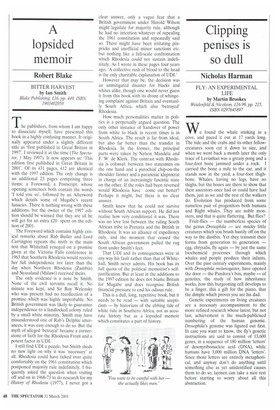lopsided memoir
Robert Blake
BITTER HARVEST by Ian Smith Blake Publishing, £16, pp. 449, ISBN 1903402050 The publishers, from whom I am happy to dissociate myself, have presented this book in a highly confusing manner. It originally appeared under a slightly different title as 'first published in Great Britain in 1997'. I reviewed it at the time (The Spectator, 1 May 1997). It now appears as: 'This edition first published in Great Britain in 2001'. Of its 431 pages, 412 are identical with the 1997 edition. The only change is an additional 23 pages comprising three items: a Foreword, a Postscript, whose opening sentences both contain the words 'I told you so', followed by an Afterword which details some of Mugabe's recent lunacies. There is nothing wrong with these additions, but the owner of the 1997 edition should be warned that they are all he will get for an extra £20 spent on the edition of 2001.
The Foreword which contains highly critical remarks about Rab Butler and Lord Carrington repeats the myth in the main text that Whitehall reneged on a promise given at the Victoria Falls conference in 1963 that Southern Rhodesia would receive her full independence not later than the day when Northern Rhodesia (Zambia) and Nyasaland (Malawi) received theirs.
The only evidence is a note by Smith. None of the civil servants recall it. No minute was kept, and Sir Roy Welensky who was present had no recollection of a promise which was highly improbable. No British government was likely to guarantee independence to a landlocked colony ruled by a small white minority. Smith may have misunderstood one of Rab's Delphic utterances; it was easy enough to do so. But the myth of alleged 'betrayal' became a cornerstone of faith for the Rhodesia Front and a potent factor in UDI.
I still find UDI a puzzle, but Smith sheds no new light on why it was 'necessary' at all. Rhodesia could have ticked over quite comfortably on the 1961 constitution which postponed majority rule indefinitely. I frequently asked the question when visiting off and on in 1968-73 to do research for my History of Rhodesia (1977), I never got a
clear answer, only a vague fear that a British government under Harold Wilson might legislate for majority rule, although he had no intention whatever of repealing the 1961 constitution and repeatedly said so. There might have been irritating pinpricks and unofficial minor sanctions etc. but nothing like a full-scale confrontation which Rhodesia could not sustain indefinitely. As I wrote in these pages four years ago, 'A collective rush of blood to the head is the only charitable explanation of UDI.'
However that may be, the decision was an unmitigated disaster for blacks and whites alike, though one would never guess it from this book with its drone of whingeing complaint against Britain and eventually South Africa, which also 'betrayed' Rhodesia.
How much personalities matter in politics is a perpetually argued question. The only other instance of handover of power from white to black in recent times is in South Africa. The result is far from ideal, but also far better than the transfer in Rhodesia. In the former, the principal parts were taken by Nelson Mandela and F. W. de Klerk. The contrast with Rhodesia is colossal: between two statesmen on the one hand and a parochial chip-on-the shoulder farmer and a paranoiac kleptocrat in charge of an increasingly fascistic state on the other. If the roles had been reversed would Rhodesia have come out better? Perhaps it might, but there is no clear answer.
Smith knew that he could not survive without South African support. He did not realise how very conditional it was. There was no love lost between the ruling South African tribe in Pretoria and the British in Rhodesia. It was an alliance of expediency only, and the moment that ceased the South African government pulled the rug from under Smith's feet.
That UDI and its consequences were in any way his fault rather than that of Whitehall, Smith never admits. His book has its full quota of the political memoirist's selfjustification. But at least in the additions to the 1997 edition he does not blame Britain for Mugabe and does recognise British financial pressure to end his odious rule.
This is a dull, long, repetitive book, but it needs to be read — with suitable scepticism — by historians of the ebbing tide of white rule in Southern Africa, not as accurate history but as a lopsided memoir which constitutes a part of history.


























































































 Previous page
Previous page